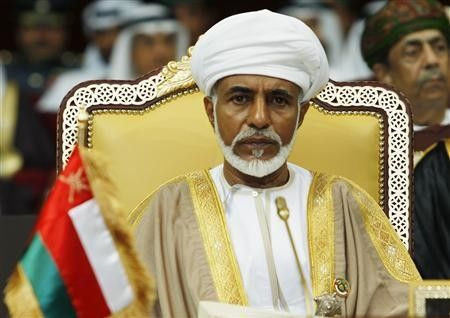Oman protests spread, road to port blocked

Demonstrators blocked roads to a main port in northern Oman and looted a nearby supermarket on Monday, part of protests to demand more jobs and political reform that have spread to the sultanate's capital.
A doctor said six people had been killed in clashes between stone-throwing protesters and police on Sunday in the northern industrial town of Sohar. Oman's health minister said only one person had been killed and 20 wounded.
Hundreds of protesters blocked access to an industrial area that includes the port, a refinery and aluminium factory. A port spokeswoman said exports of refined oil products that typically amount to 160,000 barrels per day from the port were unaffected.
We want to see the benefit of our oil wealth distributed evenly to the population, one protester yelled over a loudhailer near the port. We want to see a scale-down of expatriates in Oman so more jobs can be created for Omanis.
Peaceful protests also spread to other cities, with hundreds of people demonstrating outside a government ministerial complex in Muscat and at another site in the capital.
The unrest in Sohar, Oman's main industrial centre, was a rare outbreak of discontent in the normally sleepy sultanate ruled by Sultan Qaboos bin Said for four decades, and follows a wave of pro-democracy protests across the Arab world.
The sultan, trying to calm tensions, promised on Sunday to create more jobs, give unemployment benefits and study widening the authority of a quasi-parliamentary advisory council.
While hundreds of demonstrators blocked roads near the port, hundreds more were at the main Globe Roundabout, angry after police opened fire on Sunday at protesters demanding political reforms, jobs and better pay.
Police fired tear gas as around 200 protesters gathered near the town's police headquarters, which demonstrators had stormed and set fire to a day earlier. A helicopter hovered overhead.
Graffiti scrawled on a statue said: The people are hungry. Another message read: No to oppression of the people.
There are no jobs, there's no freedom of opinion. The people are tired and people want money. People want to end corruption, said Ali al-Mazroui, 30, who is unemployed.
LOOTING IN SOHAR
In Sohar, looters rushed in to scavenge a smouldering supermarket set alight by protesters. Two government buildings were also set ablaze on Sunday.
One woman stacked up singed cartons of eggs, powdered milk, orange juice and cream cheese in the store, while others walked over shattered glass pushing trolleys loaded with food out of the door. The security forces were absent.
There is no security. I want to live. It's normal, said 28-year-old Youssef, who is unemployed, as he left the market carrying 10 bottles of juice.
Troops had deployed around the town but were not intervening to disperse protesters, who pushed back four army vehicles observing the scene near the port. Protesters, many of them young and unemployed, have so far stopped short of calling for regime change.
The unrest pushed Oman's main stock index down 4.9 percent to a seven-month low, its biggest drop in over two years.
Sultan Qaboos, who exercises absolute power in a country where political parties are banned, shuffled his cabinet on Saturday, a week after a small protest in the capital Muscat gave the first hint that Arab discontent could reach Oman.
The government, under pressure over its response to the Sohar protests, pledged on Sunday to create 50,000 more public sector jobs and hand out unemployment benefits of $390 a month.
Mostly wealthy Gulf Arab countries have stepped up reforms to appease their populations following popular unrest that toppled the leaders of Tunisia and Egypt and is threatening Libyan leader Muammar Gaddafi's grip on power.
Oman is a non-OPEC oil exporter which pumps around 850,000 bpd, and has strong military and political ties to Washington.
Sultan Qaboos appoints the cabinet and in 1992 introduced an elected advisory Shura Council. Protesters have demanded the council be given legislative powers and on Sunday Qaboos ordered a committee to study increasing its authority.
© Copyright Thomson Reuters 2024. All rights reserved.





















